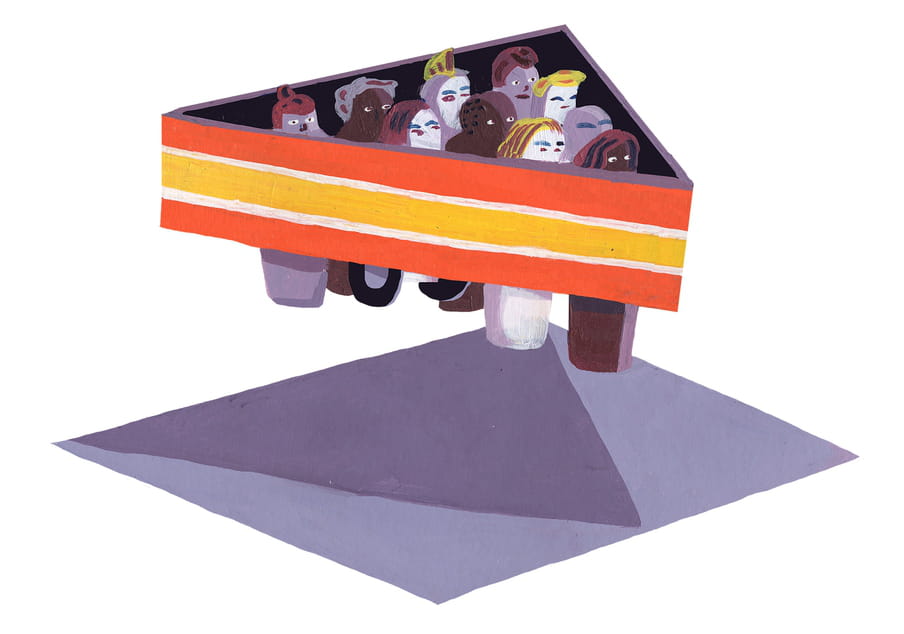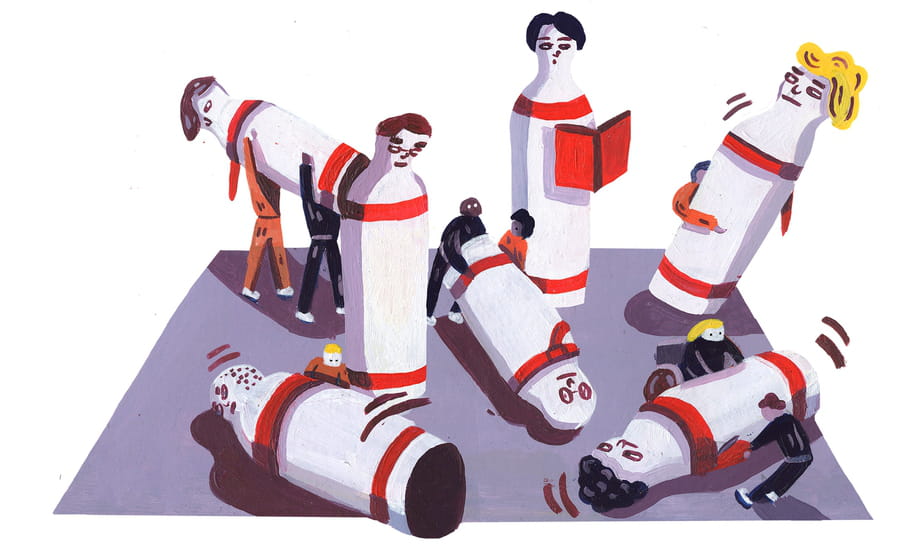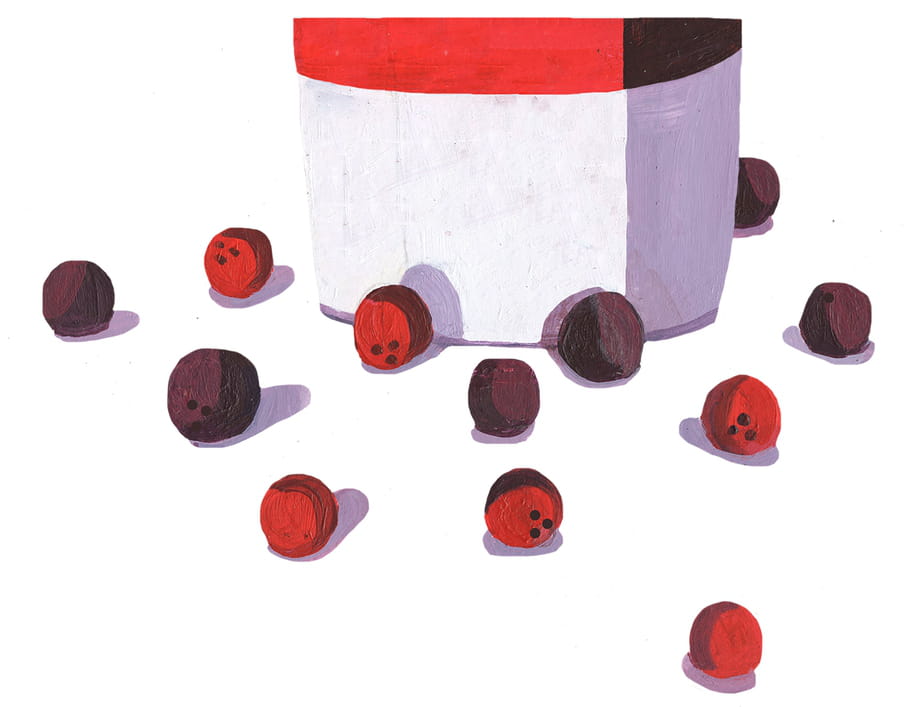A few weeks ago, I attended an antiracism demonstration in one of the southern provinces of the Netherlands, in a field on the edge of town, in the sun. I had gone there to express my support, to show I cared, but once I arrived, I realised that I had a very different task before me: to listen.
For two hours, I listened to a packed line-up of speakers and musicians who spoke (or sang) about what it was like to be black in the Netherlands. They told the gathered crowd what it was like to live in constant fear of violence, from the police or from private citizens, and what it was like to frighten others without even trying, without meaning to. What it was like to be bullied because of what you looked like, or “complimented” for your “fluent speech”, your “politeness”, how “articulate and eloquent” you sounded.
They talked, too, about what it was like to be ignored, mocked, not listened to or dismissed as crazy when you spoke out against racism, when you even just pointed out that it existed. To mention that certain traditions, customs and symbols were hurtful to you, only to be told that if you didn’t like it here, in the Netherlands, you’d better “go back to your own country”.
As if you weren’t already living in your own country, and as if all your problems were made up, imaginary.
What it’s like to not be listened to
“One thing that makes people crazy is being told that the experiences they have did not actually happen,” US author Rebecca Solnit writes in Recollections of My Nonexistence. It’s her most recent book: published in early March, it came out just before the coronavirus became pandemic and a few months before protests against institutional racism took place around the world. The demonstration I attended was part of that international movement, that international eruption of indignation, anger and fatigue.
In some ways, it feels like that was a different era, a different world, the world before – although obviously many things haven’t changed since then, even if some things are different now. One theme that ties the world of early March to the world we live in now is the oppression, marginalisation, and curtailment of specific groups in society, and that is exactly what Recollections of My Nonexistence is about.
Solnit catapulted into the public eye with her 2008 essay “Men Explain Things To Me”, in which she described the sense of never being deemed fully competent, always being seen as somehow “lesser”, solely by virtue of being a woman. It’s undermining, the essay explained, when men make it clear to you that you matter less than they do: when this happens often enough, it “crushes young women into silence by indicating, the way harassment on the street does, that this is not their world”.
The essay inspired the term “mansplaining” and made Solnit a standard-bearer of contemporary feminism. But she had been writing for over 20 years by the time she published that essay, and had countless books, essays and pieces of journalism to her name. Recollections of My Nonexistence is about how she found her voice as a writer. That story starts in the early 80s, when Solnit, aged 19, moved into a studio-apartment in San Francisco, and ends with the aftermath of “Men Explain Things to Me”. A recurring theme in her life is also the central theme of the book, as well as the theme that unifies so many protest movements: what it means to be denied a voice, to be ignored and not listened to, to be oppressed.

Mastering the art of nonexistence
Recollections of My Nonexistence is about the oppression of women by men. Solnit describes her awareness, from a very young age, of the threat of violence. This awareness was due in part to her abusive father and in part to men who harassed her on the street, but it also came about through a steady stream of media reports about women who had been beaten, raped, or killed.
It was also an awareness that emerged from films and books in which women figured for the most as victims of abuse or murder. And it emerged from the warnings she received about all the things she shouldn’t do or wear if she didn’t want to meet a horrible fate. (Don’t wear short skirts or dresses, don’t walk home alone at night, don’t live in that one neighbourhood where you can actually afford the rent, and so on and so forth.)
‘There are so many ways people are forced to disappear, uprooted, erased, told that this is not their story and not their place’ – Solnit
“To be a young woman,” Solnit writes, “is to face your own annihilation in innumerable ways or to flee it or the knowledge of it, or all these things at once.” This was unpleasant and stressful. What made it even more distressing was the fact that, for a long time, the threat was not acknowledged nor seen for what it was: systematic, omnipresent, institutional.
It was enough to want to disappear altogether, to make herself as small and quiet as possible, to master “the art of nonexistence”. After all, it was up to the individual woman to ensure that nothing bad happened to her, that she caused no offence, did not provide provocation, did not claim any space that was not intended for her.
Solnit describes how she abandoned this nonexistence, slowly but surely, bit by bit. How she learned to take up space, and found her voice as a writer who told stories about artists, activists, communities and histories that weren’t normally offered a chance to speak, because they were on the margins and in the fringes, rather than at the centre.

It’s not you. It’s patriarchy
Marginalisation is a problem, but the margins aren’t necessarily a bad place to be: it is there, in the liminal spaces, that change often begins, in silence, out of the public eye. Solnit discovered feminism, along with the firm belief that it shouldn’t be down to women to adapt, to make themselves small and anodyne, but that the system itself needed to be adapted, transformed. “It’s not you, it’s patriarchy,” Solnit writes, “might be one of feminism’s basic messages.”
“There are so many ways,” Solnit writes, “people are forced to disappear, uprooted, erased, told that this is not their story and not their place.” Listening to those who are normally ignored, and telling stories that too often aren’t seen as relevant narratives at all, is the task that Solnit has set for herself as a writer. It is a form of resistance: resisting nonexistence.
Recollections of My Nonexistence is not, or in any case not overwhelmingly, concerned with racism. Solnit writes lovingly about Mr Young, the African American manager of the apartment complex that contained her first studio and she cites the works of WEB DuBois and James Baldwin, but her focus is on discrimination based on gender, more so than ethnicity. In that sense, it’s a book that speaks to #MeToo more than it does to #BlackLivesMatter, more intent on listening to women than on listening to black people. So it feels like the memoir was written for a different era, like it’s a little one-sided, a bit out of touch.

‘What does it do to see people like you tortured?’
Then again, I suspect that much of what Solnit writes about being a woman in a world dominated by men is true as well for being black in a world dominated by white people. In her descriptions of having your experiences denied or dismissed, being constantly aware of how others see you, and unable to simply be yourself because who you are is, for whatever reason, considered offensive, provocative, I recognised the stories I’d heard during that antiracism demonstration, and have read in so many online posts, essays and interviews since then.
“What does it do,” Solnit asks rhetorically, “to see people like you tortured?” One answer might be that you take it and you take it and you take it, until it becomes too much, until you can no longer look away. Then you take to the streets, or organise a demonstration on a sun-drenched field somewhere, or you start writing to tell the stories that are not being told, to amplify the voices that are not being listened to often enough.
“What does it mean,” Solnit also asks, “to neither advance, like a soldier waging war, nor to retreat? What would it be like to feel that you have that right to be there, when there is nothing more or less than the space you inhabit? What does it mean to own some space and feel that it’s yours all the way down to your deepest reflexes and emotions? What does it mean to not live in wartime, to not have to be ready for war?”
There are still not nearly enough people who can answer those questions from personal experience. Recollections of My Nonexistence shows how beautiful, surprising and satisfying it can be to try and change that – sometimes by writing, sometimes by simply being quiet, opening your ears, and listening.
This article first appeared on De Correspondent. It was translated from the Dutch by Joy Phillips.



